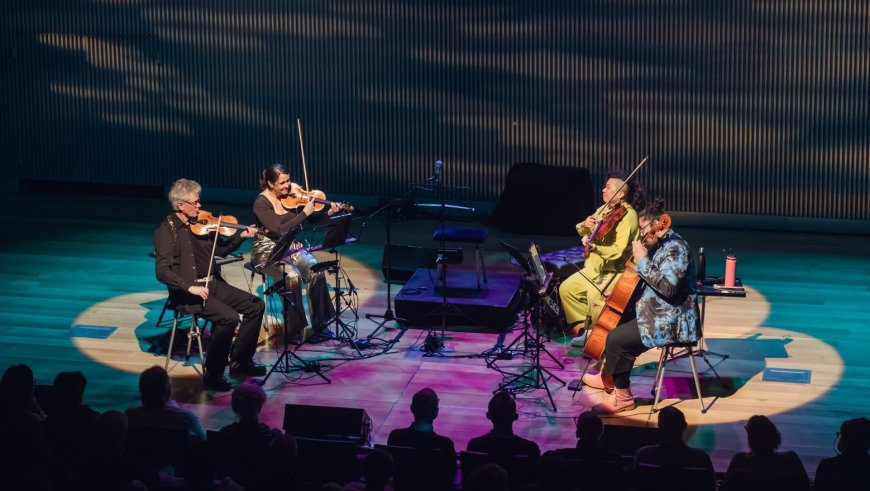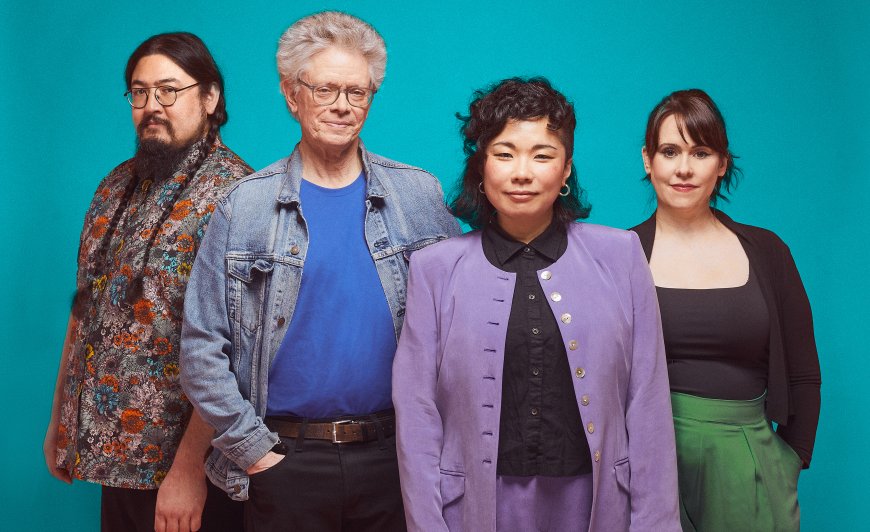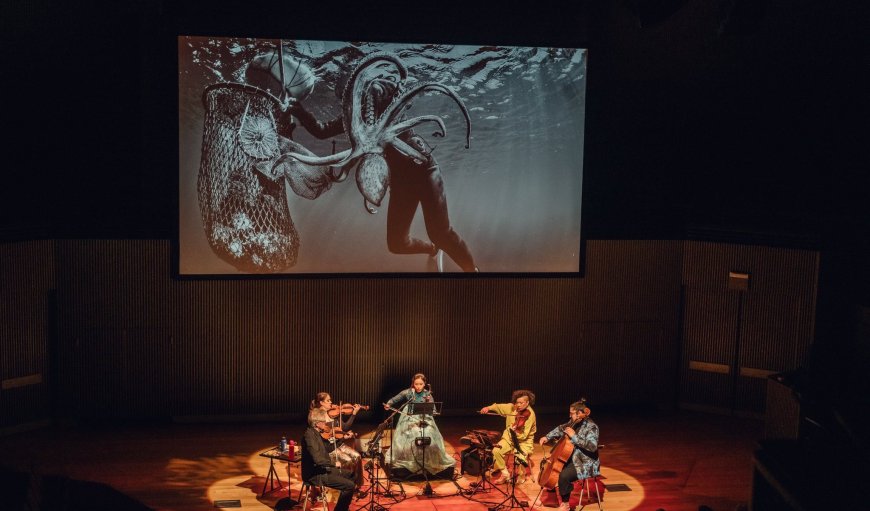
For more than five decades, San Francisco’s Kronos Quartet has been an iconic fixture in contemporary music, expanding the string quartet repertoire and taking on contemporary challenges.
Since its founding in 1973 by violinist David Harrington — who leads the ensemble as its only remaining original member — Kronos has focused on globally and socially resonant music, and the 10th annual Kronos Festival promises to continue this signature mission while simultaneously launching a new era.
The festival’s opening-night concert on Friday, April 25, at the SFJAZZ Center’s Miner Auditorium began with an uplifting throwback — Terry Riley’s “Good Medicine,” an excerpt from the American minimalist composer’s quartet-ballad Salome Dances for Peace, which Kronos commissioned and premiered in 1986. (“Good Medicine” is the title and theme of this year’s entire festival.)
It all seemed so natural for Kronos that you might almost have forgotten the big news — that this concert marked the Bay Area debut of a fresh lineup. Violinist Gabriela Díaz and violist Ayane Kozasa joined the Quartet in mid-2024, succeeding longtime players John Sherba and Hank Dutt. And cellist Paul Wiancko only joined in 2023.

Kronos, of course, embraces novelty with zeal. Friday’s program featured four world premieres — a pair of commissioned pieces, along with two bespoke arrangements. Kronos’s penchant for creative curation shone in the concert’s opening half. Riley’s curtain-raiser proved an entrancing romp, the music’s dance-like motion blending minimalist loops, ritual drones, and ecstatic violin riffs. This eclectic, folksy modernism is the ensemble’s bread and butter, and the new lineup already projects a tone that is warm, fleshy, exactingly precise, and seemingly effortless.
That distinctive palette stitched together a dizzying spread of musical styles and traditions, including Icelandic composer Hildur Guðnadóttir’s Folk Faer Andlit (in a new arrangement by Kronos), the Trinidadian folk song “A Shout” (in a new arrangement by Jacob Garchik), and South Korean musician Soo Yeon Lyuh’s Sumbisori — Sound of Resilience (in its world premiere).
A particular standout was Peni Candra Rini’s Hujan (also arranged by Garchick). Here, uncanny, gliding washes of atonal polyphony moved to seductive violin serenades and groovy percussive jolts. At times, Candra Rini’s evocation of Indonesia’s mountains and seas echoed the rustic good humor of both Riley and “A Shout.”

The concert’s second half addressed contemporary concerns most directly. The world premiere of Aleksandra Vrebalov’s Cardinal Directions marked the 50th anniversary of the Vietnam War’s conclusion. Vietnamese instrumentalist Vân-Ánh Võ joined the Quartet, playing the shimmering đàn tranh and a battery of percussion, while violist Kozasa at one point used her bow to play a set of drinking glasses, piercing the soundscape with a silvery sheen.
Gabriella Smith’s Keep Going sought to carve out a space for joy in the face of climate change. Accompanying field recordings of environmental activists, the Quartet members replaced their bows with acorns, sticks, and rocks. Ethereal harmonics evoking birdsong and back-of-the-bow knocks yielded to propulsive, euphoric ensemble vamps — the kind of irrepressible optimism that suffuses Kronos’s politics.
The Quartet’s prevailing aesthetic in confronting social and political issues has become one of exuberant excess. Kronos is celebrated for having commissioned more than 1,000 pieces, but the surfeit of musical styles and political issues means that any significant engagement is necessarily limited. For example, the five-minute Folk Faer Andlit — translated as People Get Faces and composed to recognize the individual humanity of refugees — was presented here divested of the context needed for the piece to hit home.

Sumbisori, which featured Lyuh on haegeum, explored a hauntingly aching musical palette, accompanied by breathtaking photography of South Korea’s Jeju Island. But as the composer delivered spoken narration describing the island’s culture of female sea-diving, the Quartet receded into monotonous minor chords. Telling this story came at the cost of musical interest and coherence.
Audiences had the chance to dive deeper into the ideas inspiring two of the festival’s featured composers in events on Saturday, April 26. The whirlwind mainstage concerts, however, perhaps offer more uplift than cure for our cultural ills. While we may require a stronger prescription, Kronos’s “Good Medicine” nonetheless promises the dose of hope — or at least joyful distraction — that many of us need most.
This story was first published in Datebook in partnership with the San Francisco Chronicle.




